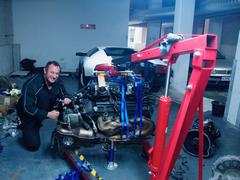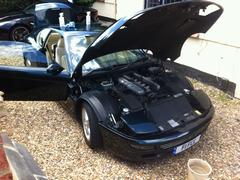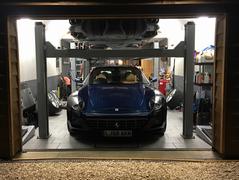DIY supercars
You'd be mad to service your own supercar, wouldn't you? Not according to these PHers!

This isn't as unusual as you might think, and we've found plenty of supercar owners willing to get oil under their fingernails. What is clear is they don't do this to save money, but because they enjoy the experience and it enhances their pleasure of owning the cars.
Ian van Reenen grew up watching his dad work on cars before graduating to fixing his own pushbikes and cars. He says: "I've yet to own a new car and so everything I have bought has always needed some level of TLC and I can happily say that I have 35 years of amateur wrenching behind me. My Ferraris are no different in that I can't imagine not opening them up to chase down a rattle or replace a worn part. To me the time spent with the car in my garage is half the pleasure of ownership, and the mechanical understanding you develop helps on the road as well. My cars still go to specialists DK Engineering once a year for their annual check and to ensure that anything that I have done myself is completely to spec."
While he's happy to tackle most jobs, Ian recognises there are limitations: "I think doing basic work on supercars has become more common nowadays due to the availability of information. It does tend to gravitate to those with older cars (10 years-plus) not only due to the complexity of newer cars and the introduction of five or seven-year warranties, but also because those who like to pick up a spanner also seem to prefer the more analogue cars.
"Working on a supercar does introduce some difficulties but probably not the ones people assume. Yes, some tasks require specialist electronic diagnostic tools but that's no different to any other modern car. Access is probably the biggest differentiator. Supercars are so tightly packaged that getting to anything often involves removing a few perfectly functional parts simply to reach the part you need."
This doesn't mean larger jobs are beyond the home mechanic, as Reeves Knyght proves: "I do all the maintenance on my Lamborghini Murcielago that doesn't require specialist equipment. To date that's only one task - a clutch change. For the e-gear car, bleeding the clutch requires the factory service computer to operate the valves of the e-gear 'box. This procedure requires the engine and 'box to be connected outside the car and special, very long cables connect the engine and transmission to the ECUs in the car while the gearbox is bled sat next to the car. After this, the engine and 'box combination can be put back in the car with a long reach engine hoist, same as was used to remove the combo. I have had a Lambo tech come to my house to do the bleed and I did the rest."
Don't think Reeves has access to a lavishly equipped workshop, though, as all of this work has been carried out in the underground car park of his apartment block in central London. So, what's the motivation? Ian says: "One of the reasons I do my own work on the Ferrari are the shortcuts on maintenance many people do. I don't know if it's at the previous owner's behest or just bad workshops. When I first went to do a clutch change, and removed the engine bay covers, I found sandwich wrappers. Not an auspicious start. Despite a book stamped for major services performed, there was evidence of parts that should have been replaced, still original and unchanged. I think part of the problem is when something goes wrong, owners often opt not to fix or replace items until they completely fail due to parts and labours costs. When you service yourself, it's only the parts price and you tend to replace things to prevent future issues."
That attitude has stood David Such in good stead. The Aston Martin Vanquish owner is now something of an expert in the model to the point his enthusiasm has grown into a part-time business. He says: "Dealers have to work to a timeframe that the cars don't always want to allow. Doing the work myself allows me to step back, think about what I'm doing and take that extra bit of care when completing jobs without racking up bills at up to £120 an hour. I can spend two hours undoing one bolt and walk away if it gets frustrating, but the sense of personal achievement at doing a great job is worth all the frustration."
All of these owners recommend buying the best possible tools and keeping meticulous records and all receipts to prove the work has been done. It also helps protect the car's future value.
So how does working on your supercar at home actually affect its worth? Aldous Voice runs AV Engineering, a Ferrari and Maserati specialist, and his view is this: "If you had four identical cars, the one with a main dealer service history will always be worth more than one that has been serviced by an independent. An owner-serviced car will be worth less but more than one with no history. Just how much less is dependent on a number of things, most importantly the model of car. An owner-serviced 458 would be a nightmare to sell but a 308 that had been maintained by a retired engineer would be favourably looked upon."
So, working on your supercar at home isn't impossible and won't adversely affect its value. As Reeves Knyght says: "Supercars are just cars, and with a factory manual and some useful links on the internet, anyone can work on them."
Gassing Station | General Gassing | Top of Page | What's New | My Stuff







